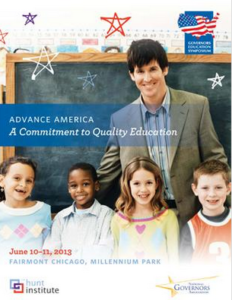

June 19, 2013
 The Hunt Institute and the National Governors Association hosted 11 of the nation’s governors in Chicago, Illinois, at the 2013 Governors Education Symposium: Advance America | A Commitment to Quality Education. The Symposium, conceived by The Hunt Institute, is designed to bring the nation’s governors together to engage in candid dialogue about critical challenges facing education. Governors Jim Hunt, Dannel Malloy (CT), and Terry Branstad (IA) served as co-chairs and provided strong, thoughtful leadership throughout the discussions.
The Hunt Institute and the National Governors Association hosted 11 of the nation’s governors in Chicago, Illinois, at the 2013 Governors Education Symposium: Advance America | A Commitment to Quality Education. The Symposium, conceived by The Hunt Institute, is designed to bring the nation’s governors together to engage in candid dialogue about critical challenges facing education. Governors Jim Hunt, Dannel Malloy (CT), and Terry Branstad (IA) served as co-chairs and provided strong, thoughtful leadership throughout the discussions.
The Symposium focused on the importance of governors being at the helm of college- and career-ready reforms in their states. Governors engaged in a series of discussions with national and state leaders to consider implementation of college- and career-ready standards, coalition-building, teacher and leader effectiveness, and resource reallocation to advance student achievement and attainment. Throughout the Symposium, governors shared the success and challenges they have found in their states. Governors also brought state teams that included their chief state school officer, state higher education executive, and education advisor to give them time to collaborate with key education leaders in their states and ensure that these individuals had access to the information and resources shared at the Symposium.
During the Symposium, governors considered the need to engage business leaders to help overcome anticipated challenges during the next two years of state standards implementation. To address these challenges – such as the anticipated score drop when new assessments go into effect or the need to achieve buy-in from newly-elected leaders – states will need strong leadership and coalitions. Resource experts from Tennessee and Arizona shared their experiences and advised governors on how they might form or strengthen stakeholder coalitions in their states. Governors also discussed the importance of effective teaching and leadership to improve student achievement and considered the policy levers at their disposal to spur improvement in teacher preparation, certification, and evaluation. Governors benefited from the perspective of resource experts who helped them think strategically about resource allocation and the need to re-examine policies that might hinder innovation in K-12 and postsecondary education.
Governors also had an opportunity for a frank discussion with U.S. Secretary of Education Arne Duncan that focused on early childhood education, college and career readiness, and higher education affordability. The Secretary sought feedback and suggestions from the governors about the Administration’s work and governors were candid about their concerns and needs.
For more information about the Symposium, see the following event materials.